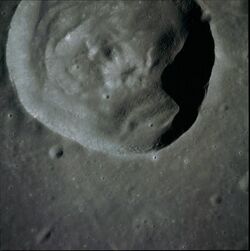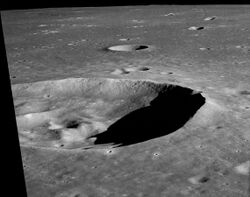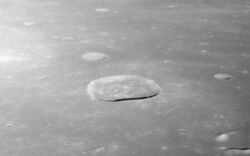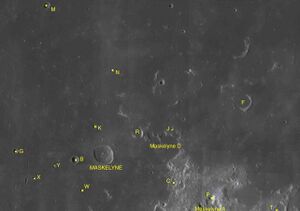Astronomy:Maskelyne (crater)
 Apollo 10 Hasselblad Camera image | |
| Diameter | 22 km |
|---|---|
| Depth | 2.5 km |
| Colongitude | 330° at sunrise |
Maskelyne is a solitary lunar impact crater that lies in the southeast part of the Mare Tranquillitatis. Its diameter is 22 km. It was named after British astronomer Nevil Maskelyne.[1] The outer rim has a somewhat polygonal shape, although it is generally circular. The inner walls are terraced and there is a low central rise at the midpoint of the floor.
The landing site of the Apollo 11 expedition is located about 250 kilometers to the west-southwest. To the northeast are Wallach and Aryabhata. To the southeast is the bright Censorinus. To the south are the lunar mountains informally known as Duke Island and Boot Hill. There are sinuous rilles southwest and west of Maskelyne - these were informally named Sidewinder and Diamondback by the Apollo 10 crew[2] and referred to as such by later missions, especially Apollo 11.
Satellite craters
By convention these features are identified on lunar maps by placing the letter on the side of the crater midpoint that is closest to Maskelyne.
| Maskelyne | Latitude | Longitude | Diameter |
|---|---|---|---|
| A | 0.1° N | 34.0° E | 29 km |
| B | 2.0° N | 28.9° E | 9 km |
| C | 1.1° N | 32.7° E | 9 km |
| D | 2.5° N | 32.5° E | 33 km |
| F | 4.2° N | 35.3° E | 21 km |
| G | 2.4° N | 26.7° E | 6 km |
| J | 3.2° N | 32.7° E | 4 km |
| K | 3.3° N | 29.6° E | 5 km |
| M | 7.8° N | 27.9° E | 8 km |
| N | 5.4° N | 30.3° E | 5 km |
| P | 0.5° N | 34.1° E | 10 km |
| R | 3.0° N | 31.3° E | 13 km |
| T | 0.0° S | 36.6° E | 5 km |
| W | 0.9° N | 29.2° E | 4 km |
| X | 1.3° N | 27.4° E | 4 km |
| Y | 1.8° N | 28.1° E | 4 km |
The following craters have been renamed by the IAU.
- Maskelyne E — See Aryabhata (crater).
- Maskelyne H — See Wallach (crater).
References
- ↑ "Maskelyne (crater)". Gazetteer of Planetary Nomenclature. USGS Astrogeology Research Program.
- ↑ Apollo 10 Flight Journal, Part 19, We is down among them, Corrected Transcript and Commentary by David Woods, Robin Wheeler, and Ian Roberts. Last update: 2017-02-10
- Andersson, L. E.; Whitaker, E. A. (1982). NASA Catalogue of Lunar Nomenclature. NASA RP-1097.
- Bussey, B.; Spudis, P. (2004). The Clementine Atlas of the Moon. New York: Cambridge University Press. ISBN 978-0-521-81528-4.
- Cocks, Elijah E.; Cocks, Josiah C. (1995). Who's Who on the Moon: A Biographical Dictionary of Lunar Nomenclature. Tudor Publishers. ISBN 978-0-936389-27-1. https://archive.org/details/isbn_9780936389271.
- McDowell, Jonathan (July 15, 2007). "Lunar Nomenclature". Jonathan's Space Report. http://host.planet4589.org/astro/lunar/.
- Menzel, D. H.; Minnaert, M.; Levin, B.; Dollfus, A.; Bell, B. (1971). "Report on Lunar Nomenclature by the Working Group of Commission 17 of the IAU". Space Science Reviews 12 (2): 136–186. doi:10.1007/BF00171763. Bibcode: 1971SSRv...12..136M.
- Moore, Patrick (2001). On the Moon. Sterling Publishing Co.. ISBN 978-0-304-35469-6. https://archive.org/details/patrickmooreonmo00patr.
- Price, Fred W. (1988). The Moon Observer's Handbook. Cambridge University Press. ISBN 978-0-521-33500-3.
- Rükl, Antonín (1990). Atlas of the Moon. Kalmbach Books. ISBN 978-0-913135-17-4.
- Webb, Rev. T. W. (1962). Celestial Objects for Common Telescopes (6th revised ed.). Dover. ISBN 978-0-486-20917-3. https://archive.org/details/celestialobjects00webb.
- Whitaker, Ewen A. (1999). Mapping and Naming the Moon. Cambridge University Press. ISBN 978-0-521-62248-6.
- Wlasuk, Peter T. (2000). Observing the Moon. Springer. ISBN 978-1-85233-193-1.
External links
- LTO-61D4 Maskelyne Orientalis, Lunar Topographic Orthophotomap (LTO) Series
- Location of Maskelyne Crater in Google Moon
- Lunar Orbiter 2 frame 5 showing part of Maskelyne F
 |






